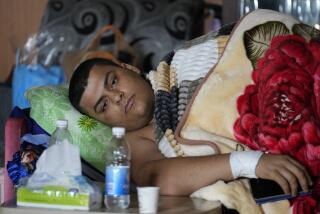2 Britons Killed in Central Baghdad
- Share via
BAGHDAD — Two British civilians were killed Monday in an attack on a street heavily patrolled by American troops, and U.S. forces reported killing 26 Iraqis believed to be loyal to an anti-American cleric in fighting in another neighborhood of the capital.
Witnesses said the Britons were traveling down a street crowded with shops and restaurants in two white sport-utility vehicles when an explosion engulfed the second car.
In addition to the dead, two Britons were injured. At least one of the vehicle’s occupants was a civilian employee of a private security firm, security professionals said. The blast occurred approximately 150 yards from an entrance to the sprawling central Baghdad headquarters of the U.S.-led occupation force.
The first vehicle circled around and its occupants removed at least one passenger from the burning car as they opened fire. Two Iraqis were injured by the shots, witnesses said. No Iraqis were believed to have been hurt by the blast.
“It began raining glass,” said Ali Hussein, a shopkeeper working next to the blast site. “The explosion blew out every window down the street.”
U.S. and British officials did not immediately identify the dead and wounded.
A British security expert familiar with the event said the “generally held view” was that a rocket-propelled grenade had caused the explosion, which left the vehicle a charred mass of twisted metal and shattered glass.
The attacks drew comparisons to violence more typical of areas outside Baghdad. Attacks on civilian vehicles used by Westerners have been relatively rare in the capital.
This morning, a car bomb exploded in the Jadriya district a block away from the Hamra Hotel used by Western journalists and contractors. Four Iraqis were injured, but it was not known whether any had died.
The target of the bomb was unclear. The car exploded near the entrance to another hotel, the Karma, which is empty but was used at one time by United Nations staff members, among others.
Elsewhere in Baghdad, 26 Iraqis were killed by U.S. forces in a 24-hour period that ended 6 p.m. Monday. The Iraqi fighters, slain in groups of four to five during sporadic battles with patrolling U.S. troops in the northeast area known as Sadr City, are believed to have been affiliated with Muqtada Sadr, said military spokesman Capt. Brian O’Malley of the 1st Cavalry Division.
Sadr, a Shiite Muslim cleric who opposes the U.S. presence in Iraq, launched an uprising last month after authorities sought his arrest in connection with the 2003 killing of a moderate rival. Battles between Sadr’s Al Mahdi army and U.S. troops have engulfed the southern cities of Najaf and Karbala. Sadr’s forces appeared to abandon Karbala over the weekend, but the fighting is spreading to Baghdad.
“There have been about 15 to 30 Mahdi casualties per night for the past month,” O’Malley said. “Fighting appears to be increasing.”
American casualties in Sadr City, an impoverished area named after Sadr’s slain father, have been limited, O’Malley said.
But another soldier was killed and four were wounded Monday by a rocket attack northwest of Baghdad, the military said today. Nearly 800 troops have died in the conflict.
In another incident in Baghdad, the Agence France-Presse news service said three people, including a child, were killed in an explosion that destroyed their car minutes before a U.S. convoy drove by.
U.S. and allied officials also faced increasing scrutiny about the deaths of about 40 Iraqis in a U.S. airstrike last week near the Syrian border. A military spokesman emphasized the importance of an ongoing inquiry in response to questions about an Associated Press Television News video that suggested the victims were not combatants but wedding participants, as local people have said.
“There are inconsistencies between what we saw in those videos and what we found on the ground,” said U.S. military spokesman Brig. Gen. Mark Kimmitt. “We have started an investigation.”
Also on Monday, the U.S.-led occupation authority unveiled a rebuilding program designed to put Iraqis to work immediately. The plan is aimed at showing quick results with small projects such as sewer systems in seven major Iraqi cities.
At a cost of $360 million, funded by Iraqi oil revenue and other assets, the program is much smaller than the reconstruction program passed last fall by Congress to rebuild the country’s infrastructure for more than $18 billion. The effort has been hobbled by security concerns and cumbersome contracting laws.
Retired Rear Adm. David Nash, who is in charge of Iraqi reconstruction, said in Washington that the pace of construction
would pick up soon.
*
Times staff writer T. Christian Miller in Washington contributed to this report.
More to Read
Sign up for Essential California
The most important California stories and recommendations in your inbox every morning.
You may occasionally receive promotional content from the Los Angeles Times.













